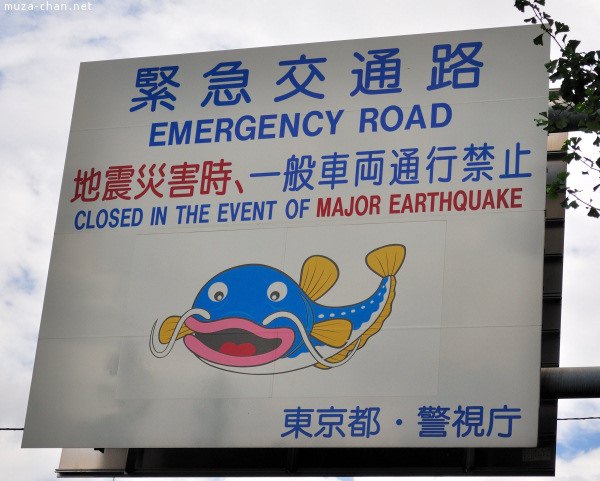Living With The Quake

„We should check our earthquake bag.“
That was one of the first things my wife said as we watched the news from Tokyo from a safe Beijing distance. Earthquakes are part of your life in Japan.
Next to our bed in Tokyo is a big black knapsack, filled with all kinds of survival gear: Water, space blanket, a small tarp, babywipes, two sets of MREs, a big knife, a radio, a flashlight. When the earth shakes, the idea is to grab the bag and to abandon the building as fast as you can. The evacuation path is mapped out and burned into our brain.
Not that the building is liable to do that. A modern Japanese building is pretty much earthquake proof. It shakes and moves, but remains standing. An old Japanese building is even more earthquake proof: It’s made of wood. In both buildings, in the latter more than in the former, the true danger is fire.
When you watch the footage from Sendai, you see undamaged buildings, inundated by the tidal wave. You can build for earthquakes. It’s hard to build against a wall of water. It may be hard, but they do. Low lying areas of Tokyo are protected by massive seawalls with big gates. But with a 30 foot tidal wave, the wave wins.
When there is a rumble, as there frequently is, you put a hand on the black bag and wait for the second rumble. That’s the real one – if it comes, you run.
Every year, there is a civil defense exercise in our neighborhood. Emergency routes are marked by a big catfish. According to Japanese lore, the Namazu, a giant catfish, lives beneath the earth and causes the quakes. In more modern times, the fish turned into a kawaii animal that supposedly can predict quakes.
“When we go back to Tokyo, we get his and hers earthquake bags,” I said. “With a change of clothes. Imagine, standing in the soccer field in the middle of the night, naked.”
“That’s why Japanese sleep with their clothes on,” said my wife. “You never know.”
That’s why I hate earthquakes.

Bertel Schmitt comes back to journalism after taking a 35 year break in advertising and marketing. He ran and owned advertising agencies in Duesseldorf, Germany, and New York City. Volkswagen A.G. was Bertel's most important corporate account. Schmitt's advertising and marketing career touched many corners of the industry with a special focus on automotive products and services. Since 2004, he lives in Japan and China with his wife <a href="http://www.tomokoandbertel.com"> Tomoko </a>. Bertel Schmitt is a founding board member of the <a href="http://www.offshoresuperseries.com"> Offshore Super Series </a>, an American offshore powerboat racing organization. He is co-owner of the racing team Typhoon.
More by Bertel Schmitt
Latest Car Reviews
Read moreLatest Product Reviews
Read moreRecent Comments
- Lorenzo Motor sports is dead. It was killed by greed.
- Ravenuer Sorry, I just don't like the new Corvettes. But then I'm an old guy, so get off my lawn!😆
- Lorenzo Will self-driving cars EVER be ready for public acceptance? Not likely. Will they ever by accepted by states and insurance companies? No. There must be a driver who is legally and financially liable for whatever happens on a public thoroughfare. Auto consumers are not afraid of the technology, they're afraid of the financial and legal consequences of using the technology.
- Lou_BC Blows me away that the cars pictured are just 2 door vehicles. How much space do you need to fully open them?
- Daniel J Isn't this sort of a bait and switch? I mean, many of these auto plants went to the south due to the lack of unions. I'd also be curious as how, at least in my own state, unions would work since the state is a right to work state, meaning employees can still work without being apart of the union.


































Comments
Join the conversation
I've been through three fairly major quakes here in western Washington. The one ten years ago shook the house in a fashion to knock books off shelves on north or south but not east or west walls. We didn't sustain any actual damage, just had to pick up books and other items that fell off shelves. I was at work, in a large old brick building with 12-foot ceilings. The fluorescent fixtures waved around and dust flew from all the overhead pipes, wires, and fixtures. Got back out from under the desk and found no damage other than a new crack going from one corner of one wall to another. May the "big one" not hit until after my time on the earth....
Bertel I hope your in-laws are OK. It's good that that the Internet is still working there...